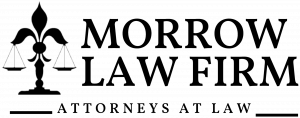Settlement vs. Courtroom: What Really Happens in Personal Injury Cases
Settlement is the most common conclusion because both parties often see the benefit of avoiding the unpredictability of trial”
OPELOUSAS, LA, UNITED STATES, August 21, 2025 /EINPresswire.com/ -- Many individuals facing a personal injury claim wonder whether their case will require a courtroom trial. While the idea of litigation can feel intimidating, the reality is that most cases are resolved long before reaching a judge or jury. Understanding the process—when cases settle and when they proceed to trial—provides clarity and reduces uncertainty for those navigating an already stressful situation.— William P. Morrow
Settlement as a Common Resolution
In personal injury matters, settlements are the most frequent outcome. This resolution occurs when both sides agree to terms outside of court, typically involving compensation for damages such as medical expenses, lost wages, or ongoing care. Settlements avoid the need for a trial, saving time and reducing the emotional strain that often comes with extended litigation.
According to William P. Morrow of Morrow Law Firm in Opelousas, Louisiana, the path to resolution depends on several factors.
“Settlement is the most common conclusion because both parties often see the benefit of avoiding the unpredictability of trial,” said William P. Morrow. “That said, not every case can be resolved this way. When liability is disputed or damages are contested, the courtroom may become necessary.”
Why Some Cases Go to Trial
While settlement is often the preferred resolution, there are circumstances that require litigation. For example, when the parties cannot agree on fault, or when there is significant disagreement about the severity of injuries, trial becomes the venue for resolving those disputes.
A trial provides a structured process where evidence is presented, witnesses testify, and a judge or jury delivers a binding decision. Though it can be lengthier than settlement, trial ensures that disputes receive full consideration under the law.
“There are times when trial is the only way to achieve fairness,” said Morrow. “If the evidence is strong but one side refuses to acknowledge responsibility, the courtroom provides an impartial setting to determine the outcome.”
The Process of Litigation
For those unfamiliar with the process, litigation follows several distinct stages:
Filing the Claim – A formal complaint is filed to initiate the case.
Discovery – Both parties exchange evidence, conduct depositions, and gather expert opinions.
Motions – Pre-trial requests may be made to dismiss parts of the case or determine what evidence will be presented.
Negotiations – Settlement discussions often occur throughout the process, even while preparing for trial.
Trial – If no agreement is reached, the case proceeds to trial for final resolution.
Each stage is designed to ensure that both sides have the opportunity to present information and arguments before a resolution is reached.
Balancing Settlement and Trial
Deciding whether to settle or proceed to trial involves careful consideration of evidence, risk, and potential outcomes. Settlement provides certainty but may involve compromise. Trial carries the possibility of greater recovery but includes the unpredictability of a judge or jury’s decision.
For workplace injury claims, where medical bills and long-term disability are often involved, these decisions carry significant consequences. The best path forward depends on the facts of the case, the strength of the evidence, and the willingness of each party to negotiate.
Reducing the Fear of Litigation
The thought of appearing in court can feel overwhelming, particularly for those already dealing with physical recovery and financial stress. Understanding that trial is not inevitable helps reduce this fear. Most cases resolve through negotiation, and even those that proceed to trial follow a clear, step-by-step process designed to give both parties a fair opportunity to be heard.
The Role of Legal Guidance
Clear communication, thorough documentation, and strong advocacy play a central role in resolving disputes, whether through settlement or trial. For injured workers, knowing that their claim will be handled with care throughout the process provides reassurance during a difficult time.
Morrow Law Firm, based in Opelousas, Louisiana, has a long history of handling complex personal injury and workplace injury cases. The firm is led by attorneys William P. Morrow, John Michael Morrow, Jr., and Stephen M. Morrow, who are committed to guiding clients through every stage of the litigation process with clarity and professionalism.
About Morrow Law Firm
Morrow Law Firm represents individuals in personal injury and workplace injury matters across Louisiana. The firm, based in Opelousas, is led by William P. Morrow, John Michael Morrow, Jr., and Stephen M. Morrow.
Morgan Thomas
Rhino Digital, LLC
+1 504-875-5036
email us here
Visit us on social media:
Facebook
Legal Disclaimer:
EIN Presswire provides this news content "as is" without warranty of any kind. We do not accept any responsibility or liability for the accuracy, content, images, videos, licenses, completeness, legality, or reliability of the information contained in this article. If you have any complaints or copyright issues related to this article, kindly contact the author above.

